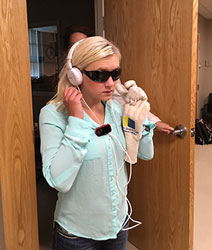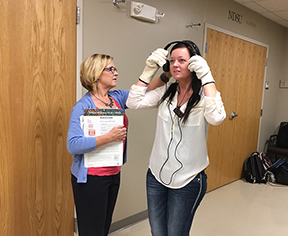 October 10, 2016 – Fargo, North Dakota – More than five million Americans are living with Alzheimer’s. With this type of statistic, students in the NDSU School of Nursing will likely take care of someone with the disease sometime during the course of their careers.
October 10, 2016 – Fargo, North Dakota – More than five million Americans are living with Alzheimer’s. With this type of statistic, students in the NDSU School of Nursing will likely take care of someone with the disease sometime during the course of their careers.
To build greater understanding about one of the patient populations they may serve, students in the NDSU School of Nursing are participating in the Virtual Dementia Tour® created by Second Wind Dreams.
Not being able to hear. Not being able to speak. Not being able to see or process information well. Through the tour, students have one small peek into the confusion and frustration that may arise from diminishing senses and cognitive abilities.
While it may be virtual, what the students undergo carries a very real impact. The nursing students experience how the loss of senses can challenge the ability to engage in everyday activities. The overall goal is to help students learn what they can do when working with patients and families who face such challenges.
“I felt really alone and got kind of emotional in the end,” commented one student who participated in the program. Another described it succinctly. “It felt like in some sense, you are in prison.”
Some students mentioned being unable to determine what was expected of them because their senses were modified, which made them frustrated. Others said the experience gave them more insight into family members who experience dementia, and provided a better understanding of the irritability, confusion and frustration that some patients may feel.
Patients with dementia may not always be able to verbalize their pain or needs or fully understand what is going on around them.

“The first clinical rotation that the nursing students experience is in a long-term care setting. This tour enhances their knowledge of the geriatric population,” said Gail Gores, lecturer in simulation in the NDSU School of Nursing.
“Nurses are a vital part of the health care team that cares for the geriatric population. This teaching tool helps students realize the difference in care needed for an elderly patient, whether they have dementia or experience other challenges of aging,” said Gores. “We want to impact how nursing students interact with their elderly patients, to help them understand what that patient may be going through.”
Students also debrief after the nursing simulation to discuss how they can effectively care for such patients.
“Show one direction at a time,” said one student. “Create calm and safety,” said another. “Give patients time to ask questions.” Those participating in the virtual tour also mentioned the importance of working with families who may have great insight into their family member’s behavior.
In addition to nursing protocols, one student mentioned what she thought may be among the most important factors in caring for patients with dementia. “Smile and kindness.”
Each semester, nearly 50 NDSU nursing students are participating in the Virtual Dementia Tour.®
According to Second Wind Dreams, “The Virtual Dementia Tour® is a scientifically-proven method of building a greater understanding of dementia through the use of patented sensory tools and instruction. Created by P.K. Beville, M.S., an award-winning geriatric specialist and founder of Second Wind Dreams®, Inc., proceeds from the sale of Virtual Dementia Tour support the work of Second Wind Dreams, an international, nonprofit organization recognized as the first in the nation committed to changing the perception of aging through the fulfillment of dreams for elders. For more information about Second Wind Dreams and the Virtual Dementia Tour, visit www.secondwind.org.


